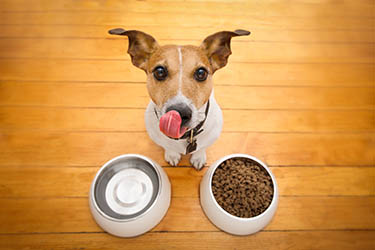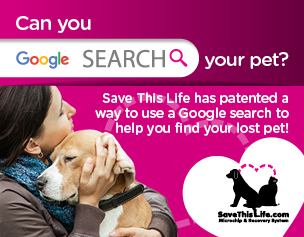What role does diet play in canine dental and oral health?

Your dog’s diet plays an important role in his oral and dental health. Just like humans, dogs require a certain degree of care to keep their teeth in tip-top shape. If you consume sugary, processed foods and forgo brushing, you can expect your teeth to suffer for it. And the same holds true for your four-legged companion. That’s why pet owners are encouraged to do a little research on the various dietary products that are available.
“Wet” versus dry food
Until recently, it was believed that dogs who were fed a strictly dry diet were less prone to developing tartar than those who were fed a diet of predominantly canned “wet” food. However, a 1996 study of 1,350 pet dogs found “few apparent differences” in levels of gingivitis, tartar, and periodontal bone loss between those animals that were fed only dry food and those that ate a diet “other than dry food only.”
In 2007, a new study examined kibble size in relation to dental tartar accumulation. The study found that making the kibble nuggets 50% bigger led to a 42% reduction in tartar buildup. In addition, further research showed that adding just one dental chew a day to the diet of dogs who were given “regular” dry food promoted better oral hygiene than simply feeding kibble alone.
Many reputable pet-food producers make veterinary-approved canine dental diets.
In light of the referenced research, most of these hard-kibble dental diet products are larger in size and have an airy, fibrous texture that fragments easily. The broken edges of the kibble pieces scrub away plaque as the dog chews, augmenting regular toothbrushing.
The Veterinary Oral Health Council’s website contains details about chews, foods, and other products whose efficacy and safety have been tested, so you can be confident that they really can help reduce your dog’s build-up of plaque and calculus.
Be careful when choosing a dental chew for your dog, and avoid items such as raw animal bones, cow hooves, antlers, or very hard nylon products. Since all of these items tend to be discarded between play sessions, they are prone to collect and harbor potentially harmful bacteria and parasites. Bone can splinter and become wedged in your pet’s gullet, and very hard nylon products could lead to broken or cracked teeth.

Although dental diets do not suit every dog’s digestive system, it’s reassuring to know that feeding “regular” large kibble and a daily dental chew will help keep your pet’s mouth healthier than it might be otherwise.
Food and water additives
In addition to specialized diet products and dental chews, there are a number of water-soluble oral care supplements on the market. These products generally contain dextranase and mutanase enzymes that are designed to break down plaque biofilm, together with enzymes, which can help prevent tartar formation.
These products are designed to be added to your pet’s water bowl, allowing a small amount to be consumed each time your dog takes a drink. Additives also help kill any microorganisms that may be lurking on the surfaces of the water bowl itself.
Similar dental health supplements are also available in powder form that can be sprinkled on your dog’s regular food once a day.
Can feeding your dog a “raw” diet help prevent periodontal disease?
A few studies have indicated that obesity and dental issues may be associated with canine diets consisting of highly processed pet foods. Such problems can largely be attributed to the high levels of sugars and simple carbohydrates that many processed pet foods contain, both of which provide a readily available source of nutrition for oral bacteria.
To combat these issues, some recommend introducing a “raw” diet of muscle meats, bones, organs, eggs, vegetables, fruit, and dairy.
Of course, raw diets have been fed by many professional establishments—such as sled dog kennels, greyhound racing yards, and hunt kennels—for many years. But, very few pet owners feed their dogs an exclusively “raw” diet.
There are also risks involved in feeding “raw.” Meat, poultry, and eggs are frequently contaminated with microorganisms that could be harmful to pets when ingested. These bacteria, which include salmonella, can also pose a risk to dog owners during the food-preparation process and when cleaning up dog waste. In addition, dogs can be at risk of choking on splintered bones.
Further, feeding “raw” can lead to vitamin and mineral deficiencies if the dog’s food is not correctly formulated and supplemented, potentially creating more health problems than you set out to prevent!
In the absence of any definitive scientific evidence that feeding “raw” is beneficial to your dog’s periodontal health, caution should be exercised if you do decide to take this route. In any event, you should always discuss any drastic dietary changes that you are planning on making for your pet with your vet before you go ahead and implement them.
Diet plays a critical role in your dog’s dental and oral health
- Feeding your dog a proportion of large kibble or a vet-approved dental diet product can help reduce plaque and tartar buildup on your pet’s teeth.
- Giving your dog a dental chew every day can also help remove plaque.
- Supplements can be added to your dog’s food and water to help kill plaque-forming bacteria.
- Feeding your dog a “raw” diet does not guarantee better oral and dental health.
- Always consult your vet for advice before changing your dog’s diet, even if you are intending to feed your pet a vet-approved dental diet product.
- Good feeding practices cannot replace your dog’s regular dental and oral health checkups!
About Dr. James Anthony
Dr. James Anthony has been involved in veterinary medicine for
over 30 years. He is a boarded Veterinary Dentist since 1989 (Diplomate of the AVDC).
Dr. Anthony has had an extensive academic career as well, having
taught veterinary dentistry at the University of Guelph, the University of Montreal and the University of Prince Edward Island. He was also a Tenured Professor at the University of Saskatchewan as the Head of
Veterinary Oral Surgery and Dentistry.
Dr. Anthony has authored over 40 articles and book chapters, and throughout his career has lectured globally at veterinary meetings.


Working Here
Our team members are encouraged to be the best they can be... at Covetrus we believe we impact one another.
Learn MoreNews & Events
FDA Cautions Pet Owners Not to Feed Texas Tripe Inc. Raw Pet Food Due to Salmonella, Listeria Monocytogenes
The U.S. Food and Drug Administration is cautioning pet owners not to feed their pets any of the Texas Tripe brand raw frozen pet food listed below because several samples of Texas Tripe raw pet food have tested positive for Salmonella and/or L. mono.
Careers
Are you looking for a place to let your talents shine? At Covetrus, we help our practitioner customers better serve their patients and take pride in providing the best customer experience possible. Search our open positions to see our available opportunities.
Newsletter
Stay current with what’s going on with Covetrus, subscribe to receive our newsletter and email communications. Subscribers will receive the latest information in practice management, sales and marketing, animal health, and more.



-3-(1).png?sfvrsn=2d806d73_0)

Leave a comment